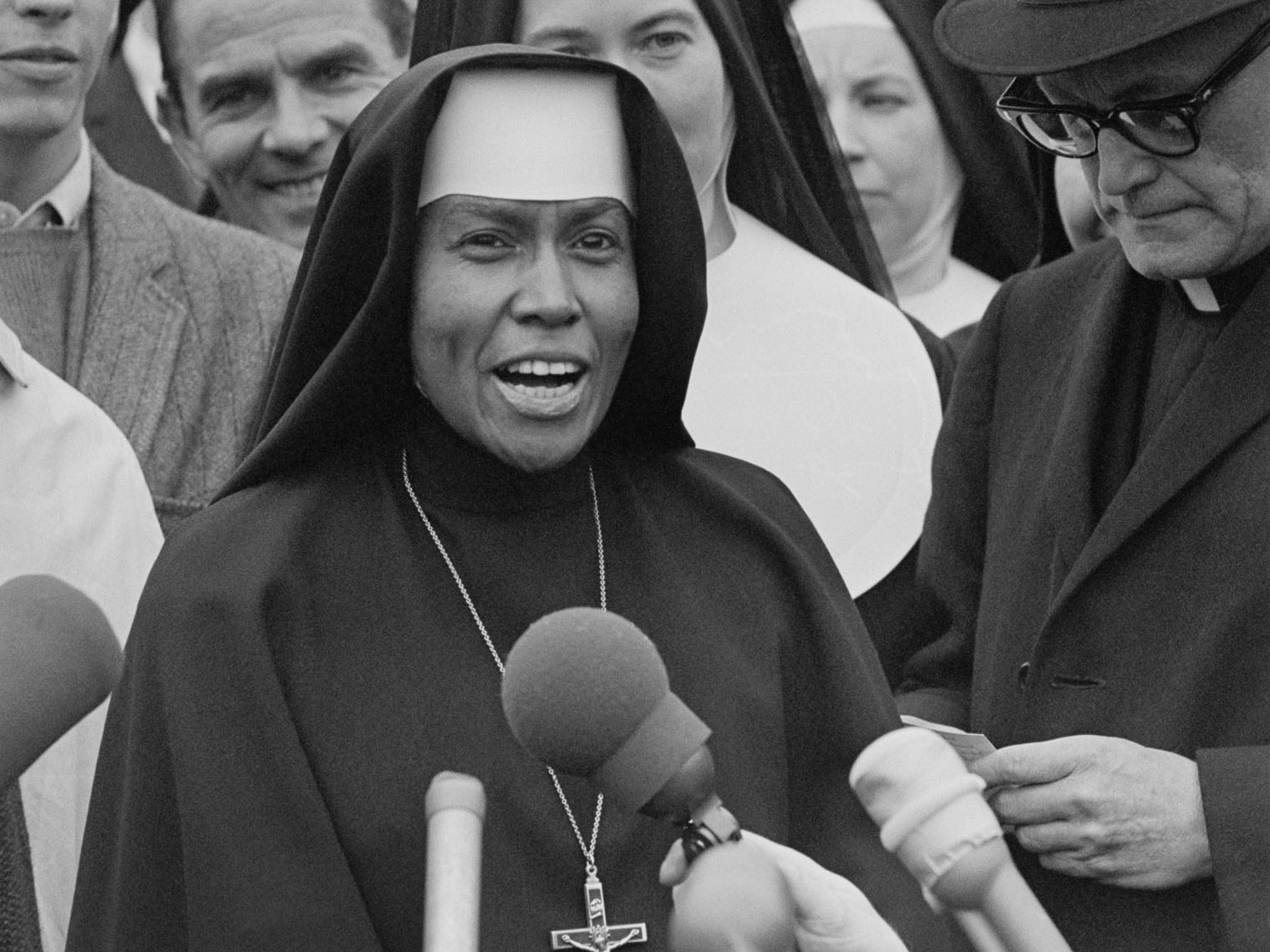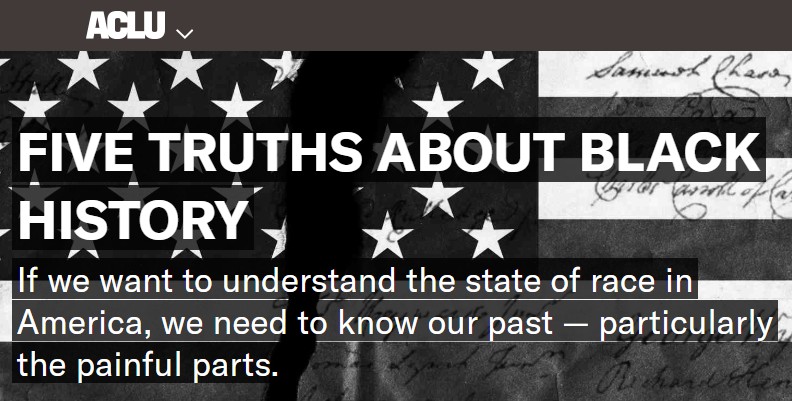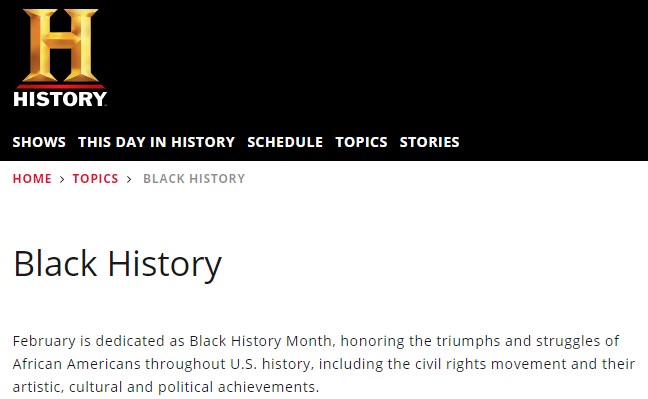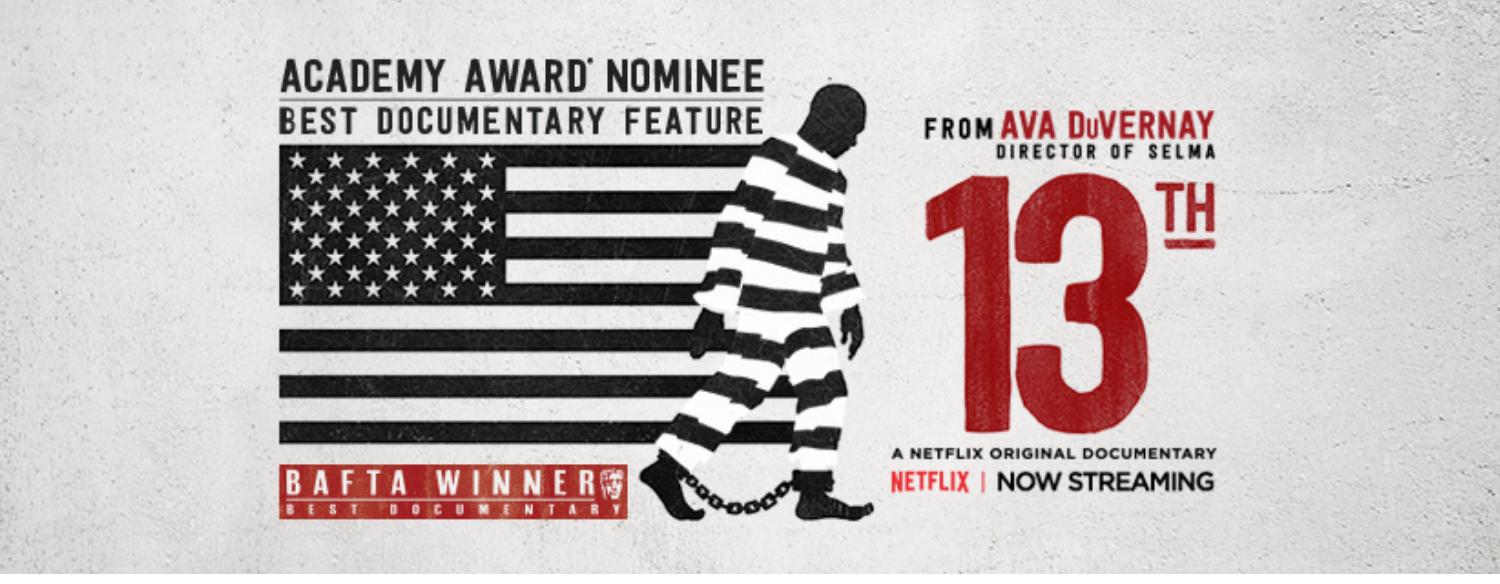


Produced by Blackside, Eyes on the Prize tells the definitive story of the civil rights era from the point of view of the ordinary men and women whose extraordinary actions launched a movement that changed the fabric of American life, and embodied a struggle whose reverberations continue to be felt today. Winner of numerous Emmy Awards, a George Foster Peabody Award, an International Documentary Award, and a Television Critics Association Award, Eyes on the Prize is the most critically acclaimed documentary on civil rights in America.
Eyes on the Prize recounts the fight to end decades of discrimination and segregation. It is the story of the people - young and old, male and female, northern and southern - who, compelled by a meeting of conscience and circumstance, worked to eradicate a world where whites and blacks could not go to the same school, ride the same bus, vote in the same election, or participate equally in society. It was a world in which peaceful demonstrators were met with resistance and brutality - in short, a reality that is now nearly incomprehensible to many young Americans.
**These DVD's are available from many sources including PBS.Org ,www.facinghistory.org, Vimeo, and on YouTube.
Stream the Eyes on the Prize Video Collection
Produced by Blackside, Inc. and nationally broadcast on PBS, this comprehensive 14-part television documentary series about the American Civil Rights Movement utilizes rare historical film and interviews with participants from pivotal moments in the struggle for civil rights. Users are required to log in to view and stream the full collection of videos. Facing History also has an Eyes on the Prize study guide that provides a framework for using the series in classrooms, important primary sources, and guiding questions to help teachers bring the history of the civil rights movement alive. Students may see themselves in the young people of the movement who chose to participate, tapping into their own power to fight for justice and equity.
|
Eyes on the Prize: Awakenings (1954 - 1956) Episode 1 of "Eyes on the Prize: America's Civil Rights Movement" focuses on the early years of struggle for black freedom, including the lynching of Emmett Till, the Montgomery Bus Boycott, and the formation of the SCLC. |
||
|
Eyes on the Prize: Fighting Back (1957-1962) Episode 2 of "Eyes on the Prize: America's Civil Rights Movement" traces the African American community's rejection of "separate but equal" education. |
||
|
Eyes on the Prize: Ain't Scared of Your Jails
(1960-1961) Episode 3 of "Eyes on the Prize: America's Civil Rights Movement" focuses on the participation of young people, including the formation of SNCC, college students' participation in lunch counter sit-ins, and the Freedom Rides. |
||
|
Eyes on the Prize: No Easy Walk (1962 - 1966) Episode 4 of "Eyes on the Prize: America's Civil Rights Movement" examines the emergence of mass demonstrations, documenting the march of Alabama school children against the spray of fire hoses and the historic 1963 March on Washington, DC. |
||
|
Eyes on the Prize: Mississippi: Is This America?
(1962-1964) Episode 5 of "Eyes on the Prize: America's Civil Rights Movement" focuses on the extraordinary personal risks that citizens faced as they assumed responsibility for social change, particularly during the 1962-64 voting rights campaign in Mississippi. |
||
|
Eyes on the
Prize: Awakenings (1954-1956) Episode 1 of "Eyes on the Prize: America's Civil Rights Movement" focuses on the early years of struggle for black freedom, including the lynching of Emmett Till, the Montgomery Bus Boycott, and the formation of the SCLC. |
||
|
Eyes on the
Prize: Fighting Back (1957-1962) Episode 2 of "Eyes on the Prize: America's Civil Rights Movement" traces the African American community's rejection of "separate but equal" education. |
||
|
Eyes on the
Prize: Ain't Scared of Your Jails (1960-1961) Episode 3 of "Eyes on the Prize: America's Civil Rights Movement" focuses on the participation of young people, including the formation of SNCC, college students' participation in lunch counter sit-ins, and the Freedom Rides. |
||
|
Eyes on the
Prize: No Easy Walk (1962 - 1966) Episode 4 of "Eyes on the Prize: America's Civil Rights Movement" examines the emergence of mass demonstrations, documenting the march of Alabama school children against the spray of fire hoses and the historic 1963 March on Washington, DC. |
||
|
Eyes on the
Prize: Mississippi: Is This America? (1962-1964) Episode 5 of "Eyes on the Prize: America's Civil Rights Movement" focuses on the extraordinary personal risks that citizens faced as they assumed responsibility for social change, particularly during the 1962-64 voting rights campaign in Mississippi. |
||
|
Eyes
on the Prize: Bridge to Freedom (1965) Episode 6 of "Eyes on the Prize: America's Civil Rights Movement" opens with the 1965 march from Selma to Montgomery and explores the drive to make voting rights a national issue. |
||
|
Eyes
on the Prize: The Time Has Come (1964 - 1966) Episode 7 of "Eyes on the Prize: America's Civil Rights Movement" examines Malcolm X and his influence, the struggle to develop new goals and create new strategies in the post-voting rights era, and the call for "Black Power." |
||
|
Eyes
on the Prize: Two Societies (1965-1968) Episode 8 of "Eyes on the Prize: America's Civil Rights Movement" explores the civil rights movement in northern cities, including the 1967 uprising in Detroit. |
||
|
Eyes
on the Prize: Power! (1966-1968) Episode 9 of "Eyes on the Prize: America's Civil Rights Movement" traces the political path to power for Carl Stokes, the founding of the Black Panther Party, and the education experiment in New York's Ocean Hill-Brownsville neighborhood. |
||
|
Eyes
on the Prize: The Promised Land (1967-1968) Episode 10 of "Eyes on the Prize: America's Civil Rights Movement" illustrates connections between the war in Vietnam and poverty in the US, analyzes the positions of Martin Luther King Jr., and discusses King's assassination. |
||
|
Eyes
on the Prize: Ain't Gonna Shuffle No More (1964 - 1972) Episode 11 of "Eyes on the Prize: America's Civil Rights Movement" chronicles Muhammad Ali's career, describes the movement at Howard University for black studies, and documents the National Black Political Convention at Gary, Indiana. |
||
|
Eyes
on the Prize: A Nation of Law (1968-1971) Episode 12 of "Eyes on the Prize: America's Civil Rights Movement" examines the government's response to the Black Panther Party in Chicago and the FBI's covert program to disrupt and neutralize black organizations, including the Black Panthers. |
||
|
Eyes
on the Prize: The Keys to the Kingdom (1974 - 1980) Episode 13 of "Eyes on the Prize: America's Civil Rights Movement" describes the desegregation and busing of Boston Public Schools, assesses the success of affirmative action in Atlanta, and examines the case of medical student Alan Bakke. |
||
|
Eyes
on the Prize: Back to the Movement (1979-mid 1980s) Episode 14 of "Eyes on the Prize: America's Civil Rights Movement" contrasts Miami and Chicago in the early 1980s, traces the election of Harold Washington as Chicago's first black mayor, and explores themes of power and powerlessness. |
||
14 episodes on 7 DVDs, 55 minutes
each
Source: PBS Video
A comprehensive television documentary about the American Civil Rights Movement, utilizing rare historical film and present-day interviews.
Disc 1:
1.
Awakenings (1954 - 1956)
Focuses on the Mississippi lynching of 14-year-old Emmett Till and the
subsequent trial; Rosa Parks and the Montgomery bus boycott; the formation of
the Southern Christian Leadership Conference; and the entry of ordinary citizens
and local leaders into the black struggle for freedom
2. Fighting Back (1957 - 1962)
Traces the African American community's rejection of "separate but
equal" education, from the Supreme Court's historic Brown v. Board of
Education decision to the efforts of the first black high school and college
students to integrate white schools.
Disc 2:
3.
Ain't Scared of Your Jails (1960 - 1961)
Chronicles the formation of the Student Nonviolent Coordinating Committee and
the participation of young people and college students in lunch counter sit-ins
and Freedom Rides, as well as the Civil Rights Movement's influence on the 1960
presidential campaign.
4. No Easy Walk (1962 - 66)
Examines the emergence of mass demonstrations and marches as a powerful form of
protest by documenting the anti-segregation march of Alabama school children
against the spray of fire hoses and the historic 1963 March on Washington,
DC.
Disc 3:
5.
Mississippi: Is This America? (1962 - 1964)
Focuses on the extraordinary personal risks that citizens faced as they assumed
responsibility for social change, particularly during the 1962-64 voting rights
campaign in Mississippi. The state became a testing ground of constitutional
principles as civil rights activists concentrated their energies on the right
to vote. White resistance to the sharing of political power clashed with the
strong determination of movement leaders to bring Mississippi blacks to the
ballot box. In Freedom Summer 1964, tension between white resistance and civil
rights activists reached its height in the tragic murder of three young civil
rights workers.
6. Bridge to Freedom (1965)
Opens with the 1965 march from Selma to Montgomery and explores the drive to
make voting rights a national issue, examining ideological differences within
the movement and the passage of the Voting Rights Act.
Disc 4:
7.
The Time Has Come (1964-1966)
Introduces the early 1960s African American community outside the
southern-based freedom movement. It describes the rise and transformation of
Malcolm X and his influence; demonstrates the movement's struggle to develop
new goals and create new strategies in the post-voting rights era; and examines
the context of the call for "Black Power."
8. Two Societies (1965-1968)
Explores the southern Civil Rights Movement's first attempt at organizing in
the North; presents the frustration and desire for change felt by black
residents of northern cities; looks at the 1967 uprising in Detroit; and
witnesses the end of an era for the Civil Rights Movement as President Johnson
turns his attention to other matters.
Disc 5:
9.
Power! (1966-1968)
Traces the political path to power for Carl Stokes, describes the founding of
the Black Panther Party, and examines the education experiment in New York's
Ocean Hill-Brownsville section.
10. The Promised Land (1967-1968)
Illustrates connections between the war in Vietnam and the problem of poverty
in the United States, analyzes the controversial positions taken by Martin
Luther King, and discusses the assassination of King and the nationwide
reaction to his death.
Disc 6:
11.
Ain't Gonna Shuffle No More (1964-1972)
Chronicles Mohammed Ali's career, describes the student movement at Howard
University for Black Studies, and documents the events of the National Black
Political Convention at Gary, Indiana.
12. A Nation of Law (1968-1971)
Examines the government's response to the Black Panther Party in Chicago and
rebelling inmates at Attica Correctional Facility, chronicles the FBI's covert
program to disrupt and neutralize black organizations, and specifically
documents the activities of an FBI informant who infiltrated the Black Panther
Party.
Disc 7:
13.
The Keys to the Kingdom (1974-1980)
Describes the desegregation and busing of Boston public schools following the
1974 court order, assesses the success of affirmative action in Atlanta,
Georgia, and examines the case of medical student Alan Bakke.
14. Back to the Movement (1979-mid
1980s)
Contrasts the communities of Miami and Chicago in the early 1980s, traces the
election of Harold Washington to the position of Chicago's first black mayor,
and explores the themes of power and powerlessness.
Ray Of Hope
Church Of Our Lord Jesus Christ, Inc.
is the original Church in Central New York for
ALL People, including but not limited to
persons who are or might be:
Straight, Gay, Lesbian, Bisexual,
Transgender,
Questioning,
Intersex, Queer,
Asexual, Pansexual, Hetero-flexible.
Anyone who is human!
Married, divorced, remarried, single,
and persons of all gender expressions.
Persons of any faith / religion or
no faith, no religion, or have no idea where to start with religion.
A spiritual home for those who are "spiritual but not religious."
WHAT WE ARE TRYING TO TELL Y OU IS WE ARE
the Church by us, for us, 4 U!
The Church made by you because
we ARE you!
Ray Of Hope Church was founded in 1983
and is serving Syracuse, Ithaca and Elmira New York.
We are in fact serving the world with live interactive worship services,
Bible enrichment sessions, and meetings
through SKYPE on the Internet.
WE ARE YOU!
We never held a vote to decide if we would be an INCLUSIVE church for you.
WE ARE YOU!
We are not an OPEN AND AFFIRMING church for you.
WE ARE YOU!
We are not a RECONCILING CHURCH or
RECONCILING CONGREGATION for you.
WE ARE YOU!
We are not an OPEN MINDED or ACCEPTING or WELCOMING
church where you can attend as long as you blend in quietly and discretely.
WE ARE YOU!
THIS is the church where YOU belong.
Ray Of Hope Church is the church
by us, for us, and made by You.
FAMOUS AND NOTABLE LGBT AFRICAN AMERICAN PEOPLE. This list was made by GLAAD and can be seen here www.glaad.org/publications/blackhistorymonthkit
Alice
Walker: author,
poet, and advocate
Alvin Ailey: choreographer
and advocate
Andre Leon Talley: editor-at-large
for Vogue magazine, current contributing editor
Angela Davis: political
advocate, scholar, and author
Audre Lorde: author
and advocate
Azealia Banks, musician
Bayard Rustin: chief
organizer of the 1963 March on Washington, advisor to Martin Luther King Jr.
Bessie Smith: blues
singer
Bill T. Jones: artistic
director, choreographer and dancer
Countee Cullen: poet
Darryl Stevens: actor
Don Lemon: reporter
for CNN and news anchor
Doug Spearman: actor
E. Denise Simmons: mayor
of Cambridge, Massachusetts, during the 2008-2009 term, first openly lesbian
African American mayor in the United States
E. Lyn Harris: author
Emil Wilbekin: former
openly gay Editor-in-Chief of Vibe Magazine, current managing editor of
Essence.com
Felicia "Snoop" Pearson: actress
Frenchie Davis: musician
Frank Ocean, musician
Glen Burke: Major
League Baseball player
Isis King: America's
Next Top Model contestant
James Baldwin: author
Janet Mock, activist,
author
Jasika Nicole: actress
Jean-Michel Basquiat: artist
John Amaechi: former
NBA player
Josephine Baker: dancer,
singer, and actress
June Jordan: author
Kevin Aviance: female
impressionist and entertainer
Kylar Broadus, lawyer,
first trans-identified person to testify before Congress
LZ Granderson: ESPN.com
columnist
Langston Hughes: poet
and social advocate
Laverne Cox: actress,
producer and transgender advocate
Lee Daniels: film
producer and director
Linda Villaros: author,
journalist and public speaker
Ma Rainey: blues
singer
Maurice Jamal: filmmaker
and director
Meshell Ndegeocello: singer
Paris Barclay: television
director and producer
Patrik-Ian Polk: director,
producer, screenwriter, singer and actor
Roy Simmons: former
NFL player
RuPaul: actor,
drag queen and singer-songwriter
Sheryl Swoopes: WNBA
player
Stacy Ann Chin: author
and poet
Tracy Chapman: singer
Wade Davis, former
NFL player
Wanda Sykes: actress
and comedian
Bayard Rustin
By Dani Heffernan, Senior Media Strategist at GLAAD |
February 13, 2012
vjB+0HeLmHwN4NsB6XGrSSkf984r87vDPxH8Wnw+lo3iHWYLS2QRRQR3bJGigZwqg8DBWmab4x8Q6xeQJPeapJAWyTNduQBQB6l8Q/Fep/ELxhqOta3Jbf2rcyYmFpu8hSoC4Tcc7RgYNYkFt5M2PMVkzxnuKqRzQxEidvLGM+mT+P1FXNPvbaa5VVdWfOOT19OaAPcvhXpMWm+FnunOJ7tyf8AaVVJUYGemQapfE3OgeFb9yC0kyKjNI5Lrvb244Ab17V1Y8Oz6C+l26O2IoQrq8QcowGWOcdM57muD+L/AIb1/UvDS2VjaT6g8jOUVEwQAuBnJ7ls/hQB+fXiHxJqI1u+ktr+5t45pmk2xyso5Psay31zU5f9ZqN2/wDvTMf617Dq37L3xHv9UkFt4VunjXADmSNFPbqWHfAq3p37G/xMuWjL6DFErHrJfwDAGM5+f3FAHoH/AATp00XnxU1/Vr5neGx0llDszHEkkiBeQe+0j6Zr7K8RWkMl+Ip7tIIAu9dse4ud3K5Occ44GTXlv7I/w5b4Raf4pXXYrGzvNSjiit4oZRKXVFctuK8D7wwM17Zftok6x3MCTSTRxgL5Ns+AFwePlyfw7mgDnZdMsYkPkxlv3nltIIWypPzfx4OM9xjHrXxD+2zcm68XWA2FdtrFjcu087zkj3r9AP7Fumhhm0/QL25RXP7xo26cjOCDnt9O+K+Zf2hf2T/iD8VvFsuqWOnyR20cMaB7qC4XkAggERY4NAH5/MMUAEnpX1vH/wAE5/iHvWN7vS/NOC0KM7OuR3BUe35iuo03/gl18Q7uSNXmSMEAlvJGBke7igDU/YYtIrz4XagLlwYEvzuikUuh44yo+te26rGmqT3EM7Wy2+T5kYV1BGAAcFcYyRxk/Sp/gP8Asb+PPhP4UvtHkgN4txcmZgXhjR12gAf61iDkZzXo6fs6+PEvXnitrOFTgKz3SvIoA6BjnjrQB5O+mQwxKiWipMoR413kBcAZ29MflXxz+2vpiReJtBuYl/1lsyucDlgxPOO/NfpOf2aPG18bgTy6RbpKM5e4lcg9jjGB+FcX47/4J7H4jDTz4h1i1mlt2bYyXLoWBP3R+77AD9aAPx5ML+lJ5D+lfrRb/wDBLTwaZmQX9vI8RAkQzzSFSexAZcfpVr/h2d8ONFIk1PVLKCMckyiZB+bXFAHwp+yvqS6V4jt4552top0dTIvUEHg/hkn8K+hNa092ZrqMx6igTYRDGrKy5yD8wbOT2B/CvYz+zJ8Ffh/NFLF4t06K4hOUFhaNcN05HEj9ffHWsnVvDngO5ZYtBs/EmpTjKqbeOK3jY8k8AOexPI7GgDw2e6GjpttLMtJC2CfLAD8ZIVc4745x0ryT9oSSbxD4Q+1C2yllPG4ZFASBSCu3IyMkleM5GBxX3j8Fv2dPCvxL0rWNU1GfWrKaG7Fv5cV2mflVSQcx46noAK8Y/bW+Dmj/AA0H9laElwdN1bSZnHnMHf7Qjg9lHH+r7Hv0oA/OKkpxpKAAdasxsQuMVXXrUvmKvBoA9XTTvGoUx/a7eFSe238+lX7Pw14rEcqTaxAvmoFLMDuQZB4xjB4/KuytnW6iDxslxsPJTBx7Utwz+W2Iztb1bB4oA4lPBerXTeTJr0jZJOBuxgD3avQPhR8JJr7xrpAvdZne0NwhmTaPnUHJXHPUA1T0mxea8wfl2+vNe/8AwB8Lza/4vgs7ZXknYCKLywMh2OMnPAAXdyaAP0Q8K/C/wjaeH9O+16bbNcmBWkaaQlyxGTk555JqxqvgnwVZW/nRaNpt3P5gPlvOq89zljjp2rmPC/w717S9YgvLiwiZISzKnmoedp29+mcV0uqaXPpVkLySz0/T4beZp1N1dBIhK+AGZvYlsD3X0oAb/wAIv4H+3XMcWg+HpI44srMVhZmk/ukYJHQcmrCQeFbK0eS00zQgYYGOYYE2iUfw5C8D1NYkuoQaLrLRXGoaDa313cQz3EEuokE7UAG3jIyTkbs9e9UL2bTP7Sh02617To9ZiL2xgXUnUF5JCzZQRjLHcRycUAdFN4u0jRxaSRf2TapCQNRxA4MOSMbdqnBPzcH25pbv4o2EVnqd5DqFp9jaIiwlMEoHmBfm3krg8leBziuF8QXWneK7y/8ADbeJ9Lj1G+vwVWC2c4ZcgRFwgDEE9Se1fPnxo8dX/haybwtexhG02SRi0YILKW646nkdfSgDf+KX7a+t6S0sdpFFZ20xHkPGMyIB1zn1PH07Vx+tfHfX9d8JXV3Pqsk4m5SNnYjKg5x0AABz1/A5rxvQ/gl4u+P+qwxaFEw05WVpb2ZisMPOR83Occ8Dk8V9X+GP2FPCWj+GTZarqt9eXTv5kskZ2qeMBQMdBQB8jT/HXUYWiljv3eQo205IOAORuOMnPTA79a9k+B37YF7ZzHS9WvLi6i+2LNFLHMd0uDhkLHt1OMHtXS+LP2BvCdxtex1W9tmTBQygOBj618v/ABq+AHiz4FXIv7SUanocX7wXVoMOhxgBx1Ue+SPcUAfpf4d+Jb+Ln1SawiupPttvKYYDfhCgQKp8obOGbOVJ960NU1+WxtrR7i1neTRhJ5RW7mlMnlhCxlKw49stjq3rX5tfCj48T6dd6ZczXcivEPmj80q2DyMcevt2r7Q8OfHPSfiBHJZaFoWp6u7W8j3i3Opi3LnZmQKQDuyF5xjNAHo9942gnOvRfZ7f7NeWMdzevGsjMySqqIF+72fJ6Y5qO6ub+7XTojBpUg0iadYEcSiRBAARIB5g3ZKoCO2R15rzW9+Lmg6Jpmgaxp3hm536pbSRsTrE6siwvs2Ar94AAHtitfxR8RPDNt420LTdI0WHVbW8WCaS7uLydnia4I3AfP8Ae2lSc/0oAyI/Ft78S7TW7Fja6Ne6igmElsJA8kicrhjJhffA5BNcr4I8FaN4wX91puqatqFoF/tM3dykcVuxWQEAkqSQyqw68ZB6c/Vx+Fnhi1jZrTRrW2mCkRyonzIcYyDXy7Z6KNP+ON54dvbu4tNK1+JmmtraTyxO4Vv3bHrgsH6f3qALMHwvkn8eaHon9m2Okz2luNRW83ecl2qGNcFQBu5BYgn+M4OMCmeKp44/Cc+sab4jiu7GG+NpqDRaetviUjGcNnALbN3Ygk9zk1afxdoXirwv4n17R4PDfhfRZY7KOCC6DtFA7BCXIYlhjbnOOnTrW34v1bS7uw8a2HiDXvDr+H7xfN0xbWaIzK5UkkqvJYHac8kkUAeN6V8QNX0681OLSPEd3La3E/2gyxHyy7MOSwHfjH4V5V+0Rqmt+INJ024vtQu7p4pzEs88pbylZSWAzwM7RXrn7KvixNA+Iy6bdsi2mrxG3UyDgSj5k/PBX/gVezftjeGjr/wB8VRQwl57WJLxPKGWHlurMR77Q1AH4ga5aGy1i8hORtlbGeuM8fpVHFdX8SbEWXiWQrE0aSIrDeQSeO/JrlOtAC9PemkZpw5FTw2xlTIHtQB7j4I8JN4TmlmlvXlMqbNgXAArrZ2jmCHqQenauGuvHsUMyp9m3gor5MnqM88VJ/wseNI9qQRhvZt2RQB6ZoJGWIbYSfTtX2V+wp4eW+8WXGoOoZbeJpFcrzkDZ9P4z+VfA2k+NH+xC5a2VQxOFx0A719e/A/4ueLfhT4PSXRNO02SS7jWSRtQgmY+WSzLsCsv97k85wKAP0DvNK1+e5cw6pHBCc4wvIyxIGMdhgZz68V514w13VfiSYvCh0K+sZBrCi4leJvJ+yRtnzN5AGT2HtXy38Vf28fif8PNAh1FLHw7OXl8sxGxmUgYznmavIJv+CqHxelGYNH8PqDyD9hlP/tSgD7Zn8Nap4i1bUtIm8O30d9e+Ivtc+pT22IY7NPuhZD147DrUOh+EPEmueOILi40XUILY69Lqk5u4Ejh2A/Jhj85JAxjp04618Ozf8FQ/jTKSFtdEiP+zprH+bms+X/gpp8c3f8A12lop4wulL/XNAH6E+AfC/ieLxZpEbaNd2GkW11Nd3UeqrbzpE7EkGCQKHJPHI6V5z+1D4Btvif8UotLjdo9TJt4oTCob90FZpWY5ypGcDjnHUVw+k/Hb413jWJvPF0Fu0lsk88MWk26FflBYKWU5wSRz6VE3iHxrqcuqa/ZTpDd3qt5l9cSpEBjg7SeBnHYfyoA+pPDMOifDXw/Z6Jp1qIre3QIsMIGM9ySOrHqTTfFPxVh0NpoMLBMsDTKJTgMB2B/A/lXwponxV8XXfiBrabXYZZEfZKIJ1kx2PTg/U+lfTfxI8BJe/BBNemlmWeK1G0oMNg9M556mgDyH4mftz3HhYEJskuGxtt0UfLz1Y4/QVz2jftKeJviVp7DVfCYu9NuSoXMXlsw/wB7uPrXzrY+H8ajq13dwC/1C2ult4kuF37nY8BUONzcjr8o6ninzfF3xtpXim90zV9JmW1sY2+0tbuxlhwSMjcPKfoDhVGRwGHWgDZ+Jnw8sNFvz4g0MPaafv3XWnumHgfvgdhyOnHpV7wP4s1Pwdc2kml3LxKZmkS5gBwEwQwJI6cjk47gZrV8I/ESy8Zai2n3hF7aXUXkmQIQN3XO1uR9OxBGT1rkL28k8Ia1qvhvU5IJZnkDWDtlQA2DliPUZwB369KAP0Y8BfAVdY8PfDrUBq9vdaTZ2l213AYWBnW6Byq8/LtDY59Ks+G/2Yv+Ec0ZLeTxHDJepq0V/wDajaHmGNWCxY3jnLE7s/hXxJ4aS51XTreK61Ga7mEYh8tJpCEXdn+8oXhuuM/rTtZ0azmaZA8KQFXjdnkZsEenJyeexP8AOgD9TZ/EtlEWElxBGB3aVRXy98avAkPjT4h2l/ZeJrTRorQtIbmO6jRyW2kbWLjaQ27nnrX5UaV8KPiF4zn1FtGtJ9QtbS6e1eX7SiAMO3zMOxFXbz9mr4l2tlPeXWnJHFBG0rlr2InaBk4AY54FAH6hWvwt+G8YD+IfHGmahMvLPqOtrK34jeo/Q1tRW/wK0dFV/FnhNNo6nULMfzJNflhbfsn/ABBvYUlzp6K4DDfejp+ANcr49+CfiP4bpZS6xLatDcymIG1mL4IGeeB1oA/X+9+LvwV8MafFDbeIvB18IyXVnvrTcp6jn69PSuW8Y/tMfDfxD4Z1LSr/AMb+H2GpW0sB+z3gfywylegzuPI6V+dlnqaDSdL1BrSOS0ntRG8WQqthcEDGMEEZxnJ96p+IPGVne6eLfTrVLZRIAJ2gMbADnAIJ5P4UAea/Eeznezhup2UskrRhdvzbT3JyeOnHvXn9ex+NVF74e1G1SOQMu2cBsdsZJz8xJNeOigBQPzAzU0IYpwSOaYMKVJ6Zwfp/k0jDaxUnkHFAG7rBmutVuEgbNvEwjUuB0GB9KfDpc6TQxxyg3EhURr5SsCT159qjs3Xau47TktxkEjv35FbfgCBtU8SQ5RQsW6ZnPTA6AA++KAPYPC3g3TtX1TT7VoXaWWVIifMIXkgZ2jivqNtJt/Bv+j2jJJaxqu63mkI6DgDLc449s14P8PLeaPXhdRBJPsqeYT6E/KMY7gtkfSvVrHV7sXkkl2ZbaboiKwBJx/EccCgDivju8nivXNB0dVcyTlflY7idzBVH6HivsTRPhMI9ItIYrWKFIYURVZQOAABXyX4cafxl+0Xpcdpai8azuEPkeYFBMS7m+Y+5NffGiX2sG3Jfw5K7Fc4W7i9TjqR6UAeV6V8LprrXtcnEaDyGhtN23+6nmf8AtWuc+K/geXTvCN1EyoVuHitsAAH55Av9TXsng3WdUl0u5u/+EYup1uru6lZlu4FJAlManl+wQD3xXnfx51XUJtL0azm0WWxF3fI3mNPFJnYrPjarH0B/CgDgfER3S3Xl3Dm6kiKxqUXIAHRuT6Z69/rXlfinQvE/xH8UQ6Vbai+laFpkMcRlLsEdiQCvysG6bicegHFdtZfZrTULcwT258+ZUcSSrvGOuxAO+e57V9IfDrwLpVtpNxdCAGSWQyCRh90Yxx70AeEfC39nGy0S+t/Ou7l4ItkU93dnAnO7cWwxJB9MEeuPX6L+Lnxz8EaB4Z/4RzVrgRWlxAI0kRgQB0GR2FfNX7ZPjTxXo2naNY+EZoreCeZlkkmOAZBg4JPc+/oa+OvilpXxD8XSpHPaeawRfONvMCisQCVySOeaAPtnwvpWi6z4gluNL1LT7ppkxHPDIHSYADqeqsBx+Hel1j4Gahe+JRqH2VQoIYzkg8+pwK+Yv2cfhl4u0t186KfSbe3Qy+aZxmSbdkYCk5ULwQeDX2XpHxkHhxI7W8VlXHz+axJz9aAKj/BbQYpm1W7NpNdBVO+1XBDAdz1z1618oftLQWz+KNPvrO4aDUIJPI82POSpOQDj0Ofzr6t8c/E3S7/TTLZKkbsOQD+pwK+NfHUs/ifxzBbwXbWrmTd5y87B64PtmgDsfhxcx3em38szQJOsyBlvAdysMdAvUEL3z0z3rp9Uv5bi/jYvBapMp2psTcCMnIOWPOO1eb+FWjn0eW3tHl1CWDUXSWe7ASdiqp0TdggqMg55HNdrp0V/dSH7NII7VSQzzRttIHZeWwRkjk0AbH7OVkGt/GNupEXl6mX2A4IDDGcf8BFel6np5mgmhJLrIhU+4Ir4h+Imu3ugeK71opzG8sh3yQO67gcHsQSDx1qtpfxV1+zUfY9ev4FX/lmtzKVB+hegD6e0v4i+GrXTrWC68R6dBdQxIksUtwqsjgYYHJ65FeafH7XNC8WeDv8AiX65YXt1a3CTLBBcI7sOQcAH3z+FeNavqX2yZ7mZYnmmxI0m1ssSMk/e9TVHSGDXkiYjRHXdkocnnp1460AdzoevrZ/DeKEZjSO6aKXGG7ghtpX+6QOvauOvfEsTzSWyWMNpFIwYT28jiTaD1J3MM/8AAeK39IVLrwzqVsSqMdkm4KSwx8rHjtwM1xJs/s94WLCSR8/KvzDGPYigDT1jVptVAMVw93bjPzXCglsYxkhgTxjqPwryiePyLiRCQdjEcdOtehTSvEkbWoEVxDIrINmWPP4jrXDauh/tGU4ILncRtC4PcYFAFUAsCO/+FOZGbDYJyOeKi3Ht+dJn2oA2YZWEJPks25ucjrjoPpXdfDNAZ7ubCRSuAoiQ4YL1PHpnFZqeBb4g4v8AgcfcFdN4M8Lrot0801z58si7RhQu0UAe4/DS0aPTr26eeOCJnSMs5A6ZJ5xwORzx0r0CfWLO4tbm8js0c7cPLCRITgZB5HI6dM1zXhWe08L+C4LmYXE4lDSbYow/zMQBzwBjjqfan6140tYPDV/AqRpcpau0gO5xluMD36cg+vXFAG7+yBaR6p8VtX16dkK2sMhLuNoDO2AeenANfZc/j3R9E0/ULptYtAYkPypOG5C5xwfWvyn+Hfjm5sNdvI49PWSSJNrNNcmNexOMKcn5a96n8da5L4JRkstKaK9JdYY71zMck8YMYHXjrQB9w+Er6XSfC9jYyZDxWNtHJ/10Yb3/AFavJv2htZlfxL4bsreT54obi4zwcZ2qpwfZj+teHQ/GTxndtqt7JKnltqjwn/iZuF3RKsZCfL9z5evXrVjSfEuq+JLy6vtVMbSpaRW8TC834ViwJLMOCCoPHqKAGSW+qxX0cqWflmCYPLsX5iAe/wA3HSvedL+Loi0uDS7Yj7QyYB75PtXzjd3mpaY8c0d6NTtfNI+1+YLgE44A7/XBqmuu3Om38dySyyIjDAPTIoA73x58TLeFjptzfRw6dAxM08mNzydcLnOMZ647jFeG+IPib4WhmuJbO3n1JZQd8ayNMSwPUAYC9B2Jp2heGJvFniGTW/E1kLnSLZ2aDTe9y+4sGkzgbOTxznvxXb6v8YtUs4mtdE8M6XpMH3dtquBgegjCigDz/wAJfHuHSLjbvudKabO1bsuyOx4AbcSy8dxx7V6T4s8Zaf4u8OBluY01SOMMDG3UY5xjrXISeMJ/EbCLW9L066VvvJLamQnPfLk4rJ1vSdMtdUgu4Slsz8fZ4gFVcduOAPagCuvi6/06FknLGPPT1Nc0l9JJqzXpBaR921AOvHatXXtQtjdPOzBlJyFVuBjvWPoF9e32vxy2EUMtxC3mLHMDsIBA5x069e1AHaeAbvxBbfDr+2dX0+7s7u0u1t455YBvuosbFBDD5ig2jOOhXPQVuaD4uuJLdpp2jsIZZMMREUDAdB8oG3BwccjJPSk1TXtZ163trLU1s7Lz8b5GZziMEHdyoXkhORydoqPQtOhttOaGSaVrOV2G4Q7Vc57MThh6gAn0oA8K+Ol1Nday9zIzO7shV/K8vKFOMAKPTqR+JrzjSZZBdFyx2gEsPX869X+Pgj0jXbURW4vreaFZHeRiPm3NjB+nFeWJr9qrhv7IQMBji4egDf1G83/ZNv8AFCMn0wxX+lS+HrvGqQo3RiUBPvxWRJ4yieGJX0WMhMqrrOw98dPeo4vGUEU0ci6UBIjBgTcN1/KgD1XQMW93qCqivJ5cuFK544bgfQ1yN7eXlrfpcRSCykYcuNqex24x+XpVjwZrNzrGqXHmQ7HZyhVDkYK4H1z9Koaro8sam4lIRFOUEhI3D/I/DHagCLz002SVJUt71pFYs8gD5yOMMD19v51yHiKKIQ200ciEsCDGobcnsSRg/hXYWkgttst+CF3r8htssee+cDGAe/XHvjF8ZizmtYzYzI8KOw2/OJDjgMynIHTsfrQBydqnneYg+9tLD8OaiqWzlFvdRSEZCsMj1HemXMRt7iSMj7p4+nagD3+BHig2hAwzgMxqaC0ZrqIJhiT2yeegrOtpn80nBI7KeK63wXZJdaxF5xTZGd48x9oyPugnI7kUAeg6Xr6rbwWN9qqabDGUEcirgGMHjPmHJyABwD1rN+JN/YQ+HbgJqEV5LcyRlJImCgqMlgQPYDtWf8Q3/te6hFxCj6hblYraSIiRogBx1HOQxyDkHHOcZrnvihqMV3oujW72tstxBDPLO0cQTc7EAHHYH0oAp/C6LSnsp7m6uII7qS5MmyTO7CAMvboSSK9Sun8NQzaYkWoQARq7OfMwAQOOuOxP5V5n8NPDlreWcKywxFtqMQ0YznduH/kPNbfxEtLfS7C+2Qwk21kUVliUc4ZR27Fl/OgBnhW9ivPB8bT38aOJrmQRPMoPzb2GeepOK9d8K6db2/hqee0u0eKSRAyo4fnGWyQeOSB+BrzDwTpEFr4HsN1jbSsICGLxqTksoYkkdeTXTaWbjTNY0y90spZSbfKuoUUBJ4D/AAuOBwQCGPTn1oA1P7Dku9USxhjuUVf3kcdq6LGozluduWOAO5+tS+K4ZUSzuprdbcmNIwVk3jKgAZOMZIGa7SXUUijt5ZbmWJmJJmiTlgc5+Y9T7AnpUepi31bw7cJNGsUMyltm5NySAElic53ZA49PyoAydImi8Q28Nogjt3QBcBsfLW1F8ONMwfMmkEin/VLwD7ZNea2OpX2gwCRWKMuCJFHUdcflTNS+NWo2NtIEh8x2XAc8gH1oA6TWfh3okCSebcSWjDkBpBlj+Wa4PVrHT447gRkyxxkBWJz+PNeW+IfiBq2r3rM88h3HJzx2qFNT1C8t/wDSbpra3C84PLUALrd6Lq4aKAliGO412Hwh0m9ub6+e0tzcyvbFNhbaCu5Sfr0FcfaBZolhgTahPXqT9a92+BUcNpLqW8RhBbgHc23b82c5oAkkf+3tYtIW0mWzjs4mHmGPzGYgDmMDgkcn5sde/Gb1x4buNNEclioi8p9v2hnAli3A/KUyRkg5P1rd1WaRnluIDcWiOGV5GWQqmSMhX3Z5wOnHHSmvePDZXX2aeae5VSxknWQjOCR14bryMUAeC/tJaWgt9Plime5mWJo2ld8liDu69MfN2zXzq1hdFwREwPvX0P8AEPw0snwzgu54oZtQheYT3ewb5ZGG4tn6g18+3NtsSVguCqRSY9iBn9SKANax8K3WoaS/lvbJIsm5UmuEQkY56n6dfeqc3he/hXLxwcf3buI/yatrwu3krfQCGFtswy0kSuQN3HUfWmX1zNM6gxwBpGZTtgQfMAMdB9KAOh8CGOC/hnUqWMKswyOHTscfhXR+NvA17b38t5pN0mqRShppFuCgaM9cFWJJGO4/CuD8GQwTf2fI8EbsJmVtyAg5yOn5V1vi7SJf7DszElnFZN5qOYoVSVQSG27sZIPr1HGKAMK0nmsIFtxBBqOpSsG2xyDfAADjZzgn2K8Y4rkdVaV4TDPAiTsSzZBEo+q9h36V2Otay9jpsFnbW+kyRlMIVt2M4AGMknGMZOCMH9a46a1udSvE82SW7uXGCZAS360AcwRgkela81hNqkcFxAhfMQVz/tDj+QFZ+o2r2V5LDIpV1PKnqParml65Lp1uYlJwW3foKAPX4Ej3jAGcfxfrXY+EZPKt5im0SOyp86gqVzlh1GTwOOc+leeWuq2jFS15Bx/dmU/1r1218M6jo/gC41i5tJrRLcSTus77d4xhcKc4JHTOO1AFXT7WXU9TubjIcIoITapVSW4x+BOAT2rkvH12LnWrqxTA8oxWigcHIBc/rV/RvitBYMY30G+Es4juAWKKxjYFkIOeQSc1zN5ILnXDfyWOtI7ztcENY7huOMc7uQP60AegeBbFkkiYSzCFXcnbIwJUYQEc+jU74jWQbS5WjkuDLNMluplkLrgspPXOfun9Kz9J8VWuj2SPPZ61FBGgiMrabhVJPc7+5H6VJrHiOx8RQ29vG2ooIZ/tGTYMcsRjHDdjQB0XhqLzfCVrJJc3CZiLEK21fmkPQY6cD8a7nw3avLa+YsYKiNVBl55z1/ECuE0zWLGHSbayKXwEaJHk2TjcAR/OvX/hUlt4p067Wy2yzQMqyQtHhxjOMgAkdOtAFa9ZRFBFJHcSRgqu63UEKeOcFse+TxTdQgL+HpkWVpI43YqLhVDNnJzwx9sYPTHFer6N4IOpRJJdWxniJyqovy9f17V2Oh/BiTxReWWmW8Di2kuEW5aNOEi3DeSQf7uevtQB85XmizppNu8GI5jEAQwBDADoRXz58Rbm40i4d7m2ktsk7ZIBuRj9O1fbXxpsP7D+IviW0SJYBHeuBFtwAjfMuB6FWWvB/G2l22t27QzQIyY5U8qfp3FAHyJeeLY1mLIksr9gwCgVc0y9u9ZmTzmaOLpsHQV1njT4T2Vg6XNtciJmb/Ukhh/Q1l6Zo8umXH7wCSMfdKDINAHRaHp22VWf5kyAFA4/GvbPhRbW+rfEPRvClzDGx8QRy29vcdHhuAuYSD6FvlI9GJ7CvJPC6yXFxvKgoTgrjpX09+yN8Ibj4i/HrwzrMSOmneFma+u5sfKWIxEmfUuAforUAcpq+izactxahLuzWJ2SWK4lCDepAJVBjgEHqex49ZLzxA19c29vF5kssUO2TAYKT3bAwOTjB9u9fdHxZ/ZSm8X+I7/XvD+rQadcXjCWSznhxGZMYZvMUE89cY6k189+Kf2U/HWh3D3N7pz6lBGc+Zp4WcY9l5b1/hoA+TfHlrczac6F2FuS6mI9CxV8H9RXgN0N0JzbREvZ5/i/gfHr6JX138TtEXTkvdOdFtbgSRusMx2PjIyecds14bcfDeNBG76lACIZIykbIxAbd3LjpuoA4DSnb7TdRrFEpeCKYkBjk7R7+rGk1DzLeSaUwRMY7hZVB3fdOT6+wrol8K3emalGUCSRJAYmcyxgk5OOAx/2e9S3GgNfvcLJNFDmJF5dW5G339v1oA5/QCIJ5E2pFHaXOcIDyM8HJP8AsmvTAkepaDNAzKqIpXcxJO7P5Z7Z7VwN1pElg146yLKJY1GFI++AOf5n8a6jw1rEVrbzvdyeQzMoAYgDlctz7HtQBw+t2nkWUYRFSVCVYEAlgTkYBHHU9DWPLJILa6k+0RHy5FA3NmUnp8u7DYHfFd7eS2jTiWNRc4lygiCtuPOAAcjkHvWNc3dxpMreboql2XbG1ywUpzklVQDJA79ulAHm+rO01yZnkaZ36u/JP1qjitHU4WXLOwYljk7sknvWdQB6T8LfDUnifxppNqfKlia4RpI/KQFlBywzjjgHmvrXxTqAi0jVVktmaJbdvMhKA7wAWK475/WvE/2StBXUPGN7eECSOxtGZjs3Yd/lX9N1fRkrQSx3rSzMgU7QWQqM/wCPSgD4P8VeIp9W1maWHzLeHy44RHkfdRQq5wMds4r1mw+EtxZyaYNV8TXNnbX9n9uhe3SOYtGtmLiVsbxwrExg55IPpXU/DOLQPD2reNL/AFXwHc+KNMS/hEd+lmlxHamEtJOMORuDIW3DPAwSRxXovh2TwbZaXY3ur/DDVGWOdVvZX0SGOCbdEYwd2MofO3kIpA+XnJAwAcBpP7Pmpappum3Fz4nntra7gF4ZbyziSJoGgeYGN2kCuVCor5ICs4GTWt4P/Z68Ra3q9lDp3iC1aynhmuI9QaERxFVuHghAJIyZGjYgegJ5xX0n8OvhH4T+Ies2unab8Pr5JFjghma40wRRx7AS0jMWCqCwZSDy2R/d5+o/Bv7GHw80S3SS/wBFiu7k7mMSTSCGMlgQF5B+XGAT6t60Afmf4M8CeNtS15tNjtb2S9SUwSwQwlnDBtrAgD619m/A/wDZL8V6TDdPeRjRIbh1JEz4ZlCgD5VOQevXFfZ+g+FdJ8M2v2bSdOttOg6lLeIJuPqcdT7mtUKBQB514W+CukaBHEbqa41OaMDDTOVXgf3Qf5131vZRW0QjhiSJB0VFAA/KrJHFI5CLk8AdzQB8rftj/Ca4urZPHejwGWa0iEWqQIOXgH3ZQO5TkH/Z/wB2vh3XLj7VHuUAH727PB4r3D9sT9u3xPoni0+HPBKxWWiQuPM1AqHkvgD8wUnhEyCOOT1zg4rMsNK8DfGHRdKuvC+matY6hqNq0twdMgNzbw3A/wBYjpgBOcnCkYGCAQRQB8i+KoPtMjHlz6jtTvDegNcyxgqcdORXsmv/AAU16y1tLa5sHxNL5McwUiNj65xx684I71rxeGPDPw9jMt5DLrs8Z4Xzfs9uT3HALsPfKmgDK+GnwO1j4seJYNI0CwCNw1zeEYitkP8AG5/PA6mv06+C3wf0b4L+C7fQdIUyEHzLm7kA8y5lI5dv5AdgAK+F/g5+3dpXwp8Qx6Lrfh+y07wxeTD59Lh2PbE8bzkkyj13Hd6HtX6M6Pqtp4g0q01HTrmO7sbuJZoLiFtySIwyrA9wQaAL/Ow4pNnOSM1Iy4gfJ52mhSCPWgDnPFvw+8MeO7T7L4h0HT9ZhxgLe2yybfoSMj8K+eviH/wTw+F/jBJJNGtpfC92eQbQLNDn3STJ/JhX1OeMk9qi42ljjigD8rfjD/wTU8feFbK5vvCw0nxjbxKSIIYRb3ZHqI2O1j7B8nsK+Cdd0278Ma3f6fq2m3FhfQyFJrO6tzHJC46qVPK49DX9IJl+XIPXsa8M/aK/Za8DftD6YTrFlFp/iONNtrrlsgEqEdFk/vp/st+BBoA/Ci2NveRkiCNsHB3AqR+RpV8iCXbLptrMD03NIP5OK9h+LvwH1b4NeOdW8Oa9b+Tdx4aOWPmOePJ2yIe6kfiOQeRXDX/h1BLC6KcFQ2PagDnfBiJB4ogkaGMpDI7OpJxtwMAc9q9hmTQblXmexWFmU75Y2YswJ53HkY715FY2s0HjLcIyYxweODlcc139vKiLgxmNhyyjccj3wen+NAFy68J+D9Rt0sbeMlipcRrdFMcfeB2kE/WvDNXsRpmqXdoG3CGVkDZzkA8V6peLb3IaWExuF/ufLzx6jOa878X22zWnaNXAdQx3AZz07D2oA+sf2U9Hk0bwVf6kj+TJe3ON4i37kVcDjjuW716hd2M2otJGsygBSAZl2k47gc/XvXL+F9Qi+FXwiivbyJ2toIFlkt4SDIzuRwCeBy3OTwAa0LD4n6B4lsrG9iv4rBZow5jugysh9NwGOOOR60AeZeGdL8c6LA6f8I3Y30Dy3hSW8hDsFuVKSqCsg+UgZ6fpxX0x8GPCnxB+OOsLod7pthp2kJeQ317crC4SJEdX2j5yDucFsdSWbkDp87eF/i14+8SfEWHwdoQtNYa4vfstiRACZVLkKdy4BHcnpwa/YT4VeAIvh94Ss9PPlSX5QPeXESbRLNj5iB6dgPSgDo9E0G00S18m0hWJSdzsB8zt3LHua1QMelMB96eOaAF/ClxgUAUUAGcmvNP2h/Gg8F/C/VZYpfKvr1fsdtg87nGCR9F3H8q9JJww5rwnxzoDfFr4niK4JPh/w06p5Y6XFyQGYH2Hyg/THegDxHQ/2S9K8a+AftPi/SRdXzt50ESuyyxwFCCMjo/zbwPVVB7ivn3Sz4w/YO+K8Ukjzaz4G1RlBdTtivYe2eyzIDkev0Jr9MrS3kijII/CuV+IPwr0D4k+Hbnw/r1il3pN70GMNC/qp/hIPIP4dOKAObnTwx+0J4T07VtG1R7zw/IpYm3JVvM7q6jBDL0wfWsiw/Zx8EwXi3B0I37RHcJNQdpB7DaTtx+FfEXifxD8Qf8Agn98VbzTNHvRf+HtQKzRfbIS1veRg8Bh/DIo4JUg9OxrsfEf/BU2/wBY8JavpsPgyDTdQu7OS3gvoNSJEEjKQJApj5wTkDPbrQB8k/tc/EOHxz8dvEE2lNGmh6dP9jsktwBFtjAUsoAAwxBP0xX31/wSr+N+qeKvCGq+BdVWae30kC5067cEqiMfngz7E7gPdvQV+dPws+CXiP42eKrXT9HtnMdzMFa6kB2jnk5798mv1j+F/wAL9K/Zo8D2OlaMm64jIknusYaWTHzEn0PYelAH1fK48l8ddpqGJyx+lZGh+IIvEPhy31CDKrcRD5e6seCPwPFasPzAgdaAJGJKntmorw7LfA71NGCxPQAVDefPtGeM8UAV2G2M+gFc1NdNFdQbTkPklfxrp5ceW+SMYrkLwfvoWwCUidunpQB8/wD7WfwR/wCF5+DruXToYn8T6Kd+nYGGmjKKZICe+c5X3GO5r8w9XsjiFJAfMUsjRqdjBh1GD361+x2gX8n/AAml9Aw3Rjy5cfVF/wAK+Hv24/hXpGg+PLnxVYQMbDWFMkiW+AI7lQN4xjA3DD89SSaAPkPULIWU3mRAxyOg+Y5GD2Genr0qFLl2maOUTM7gbVB3fr2/Culm06BrUrFJLLE4w3IBXjrxjmuKa1eSdkgkJxnhstjnuaAGalHG4kR3VecYCE49Rn1rNbQxeBXW5SEAbdpQH+tW3iR2VLxcOVwGjJO/6nIP86WPS5EQA2s7ehCA8fXNAH19r8Fnq/hN7Sc+ZbsPmVVOSPQjtTdO0qys/DUjRonlxxnESrzt24xxV82P9psto/kKzAALv2gjPXJ4H51S8aTw+HfDd35KwGWNNhkiYMWwMnHHI4FAHqP/AATH+B9pca34m+Jl7aqVguJNO0ncvCMeZZB77Sqg/wC01fopHKC6qOjA4ryX9mbwMnw1/Z+8HaQYzDcLp8dzchhg+dL+9kz7hnI/CvQhq6RXdpGeTKSAR24oA3IznvU61XjU5/XirKqQKAFpDSnmkI4oAhlyDkVyWieGIvD1rJEjtK8kzzyzP96SR2LMx/E110gqrJEpByetAGYR8pB69uaghHmTpEV6sMg1oyQgHFRwwqt8h78/yoA8D/bH+B9j8X/hZqemsg/tg/vdNkxyk6jIGewYZU/71fiFq8Nzpl/PZ3KvDPC7QyRtwVYHBB/Gv39+LFjq3iGXT9M0zKguJZGjnEbAA4574GQePSvxd/bI0uz0v9prx7aWS+RbJqTsyj++VUuenGWLH8aAPvb9hbwG9h4T8J6xZRr5Fzp+926HJB3E/wDAq+r9c8K/21E0J+bP8VfNv/BNrxrZeKPg1p+mJMhvNESS0uBnkZkLocehU/oa+yrc25bCDJ9qAOa+H3hm78OWU1nPIGtPM8yMZ5U+n6CutgJyTyBSNJ5fA5pY2OAelAFlcKMZqjdPvuEHTBz1qZpDuz1FUGmzctx0oAnmcrG/PNcVcMXimYkrshk57D5q7B5SInbHb0rlJcf2RfPj5hHKM/QmgDzO+updJ8e3kgfy/PsY9pc43Nkj+teF/tX+Grz4nfBnxLa2olhvbM/a7Yj5XMqIG2fio2/8C9q9g+IWsLaGw1CZGaIzQRMpBx87Beo6fe/T2rLMzXuna75xE4hlMeeMFmRT+i0Afkp8M9avdSsr6G4vGd4ipRp5OMc/L19au6lMhvJLddnmhsyKqH5lPOc56Vra34Mj+Hnxp8W6AQI7WGeV7YNgDyWw8Rz/ALjisjxFbSwXhuYSXcRcfNg9xkEDnqP1oAwdStWhcSRzGLa5AYuScf0FXIrzUig8m83IO4yf61Yubcx6bvmDyNgMSnzZHoeM1Wsp1EA8pnVCc4UEigD7jgOn3tnbz2s0d3DMA0c0IBRwcHOe9dN4C+GJ+J/xF0PRXs82Tzi71HHAFujAspx/e+7/AMCrz/4dHb4d0OFeIhHjyx93hBjivsj9lG3iXWfEsgiQSLa2ahwoyAWlJGfcgflQB7h4h1uPSXtbY8ecSu0DoB3/AErNt78tqEYZAfLRpFI5zxWb45kf/hNNJTcdmwHbnjvVnSz/AKZD/wBcpR+tAHdaBctf6Xb3DAhnXJB61q4wKyPDJJ0yPJz8x6/Wtg/xUANIoI4pT1/Ck7UARSJmqtxGTxV1ulQzdKAM9UKkdTVdAf7VQeoPH4VfX7wqGMf8TSL6H+VAGNqlqiapFP5YEgUr5ncZ7V+GX7Z8Rtv2nviImcn+1ZCW+uCT+v6V+8OuAbFOB96vwc/bN4/ag+I//YYl/nQB2H7C3xD1Lwx8WbXSrbUp7Kz1P5Zo4jw5QFhkH2DLn3r9ofDnkT6bBcW2RDJGHBJySCO5r8Cf2fZHi+L3hJkZkY6hCMqcHknNfu78J2LeDbMEkgFhzQB1wjyBUnl7FyaEP3anf7ooAqkcHj9aoshExIHWtBqpuT5rc+lADGQm3b0Nc+1szaTOpHL+YMj3ya6S54g445NY0P8AyDf+BN/WgD5r+Kztd/D9/Lf/AEmAwzINucmKVSRnt8oJ/A+lRfD2ZNY07XI1Xf8A6a6nPOSY1H8h+tWPGTt/ZKruO1mmVhngjY3B9q539mti2n+IgSSBe9/pQB8m/tc+FPsPjrwb4zii8uC+ifTbqRV+XzY8lM+5VwPoleF+NCV+xzfMjbjC7NkdVyp5OcfL1NfX/wC1Uo/4UerYG6PxFZlD3UlZQSPSvkzx996xPcyKCfyoA5GbVJUiaaWMOGBVXDjDduOg6VWs1tmhzLazhyT90tg+/BNVdc/dX1/EnyRCEMEXhQdvXFXvDf73Soi/zkcZbmgD/9k=" border="0" v:shapes="_x0036_">Throughout Black History Month, schools and community centers around the country will be screening the documentary film, Brother Outsider. The film chronicles the life of Bayard Rustin, an openly gay African American man who worked for more than 50 years as an advocate and strategist for various human rights initiatives. He most famously advised Dr. Martin Luther King, Jr., and was the chief organizer of the 1963 March on Washington for Jobs and Freedom where King made his infamous "I Have a Dream" speech. Yet, because he was gay, Rustin's work and accomplishments were often carried out behind the scenes, and his legacy remains less well known than that of many of his contemporaries. Today, on the GLAAD blog, we are taking the time to highlight the life of Bayard Rustin, as well as the lives of other 'brother outsiders' from our history, who dealt with both racism and homophobia as they paved the way for others.
Bayard Rustin was born in 1912 and grew up in West Chester, Pennsylvania. He became involved with activist work after moving to New York in his early twenties. Rustin joined countless organizations, both domestic and international, throughout his life, and was committed to the pacifist teachings of his Quaker upbringing. He was arrested and incarcerated many times in his life for protesting war, racism in the South, and colonial rule in Africa, among other reasons. While in India, Rustin embraced Gandhi's policy of non-violence, a practice he persuaded Dr. Martin Luther King, Jr., and participants in the Montgomery Bus Boycott to adopt.
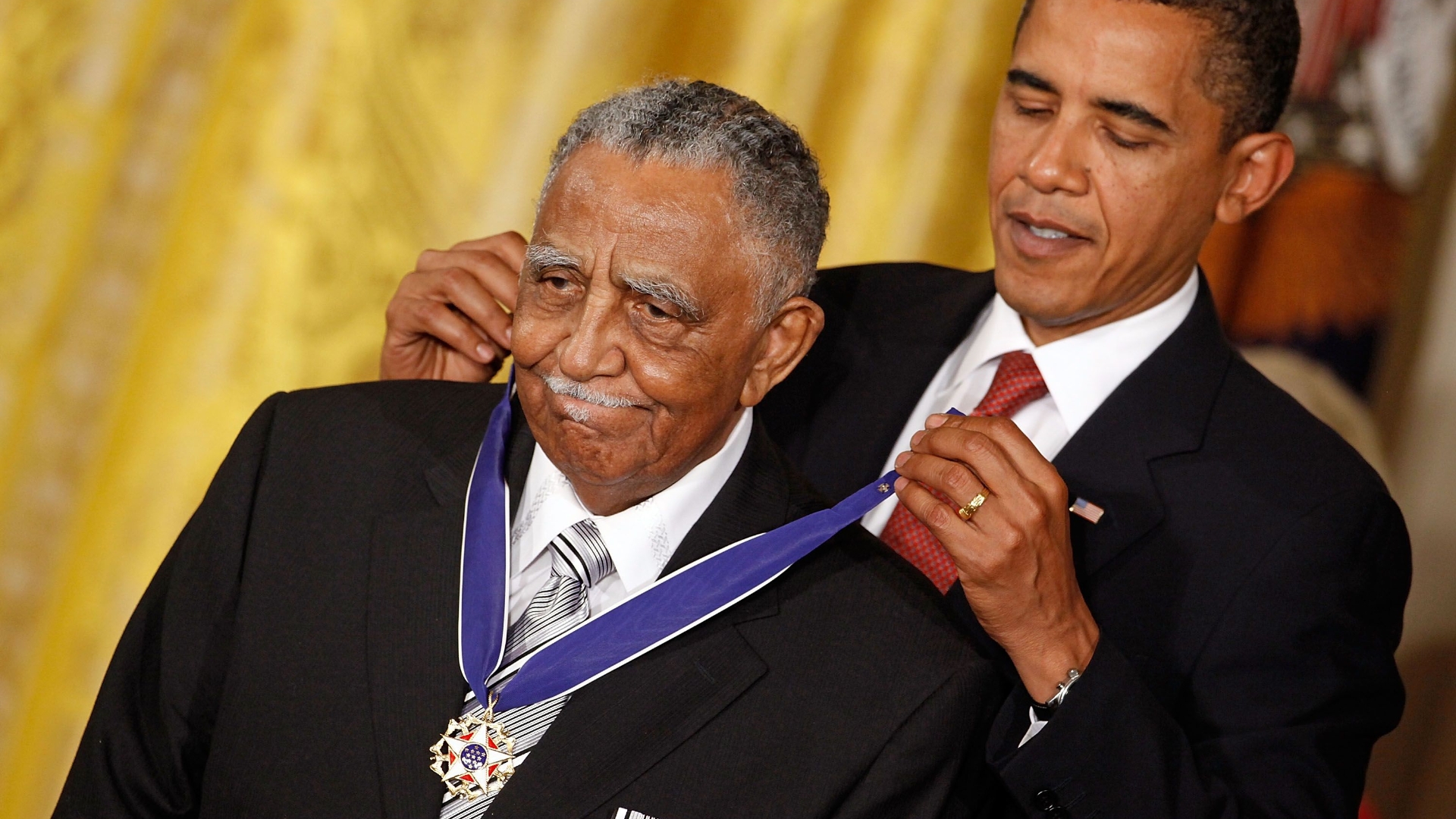
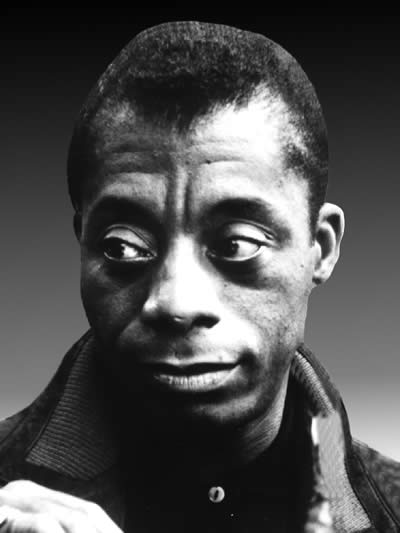
.jpg)
